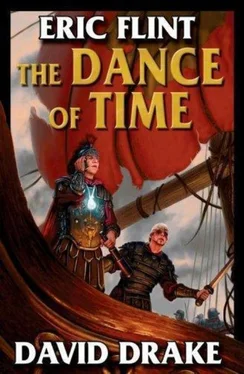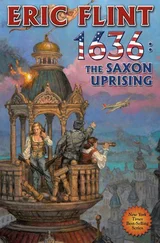Eric Flint - The Dance of Time
Здесь есть возможность читать онлайн «Eric Flint - The Dance of Time» весь текст электронной книги совершенно бесплатно (целиком полную версию без сокращений). В некоторых случаях можно слушать аудио, скачать через торрент в формате fb2 и присутствует краткое содержание. Жанр: Альтернативная история, на английском языке. Описание произведения, (предисловие) а так же отзывы посетителей доступны на портале библиотеки ЛибКат.
- Название:The Dance of Time
- Автор:
- Жанр:
- Год:неизвестен
- ISBN:нет данных
- Рейтинг книги:4 / 5. Голосов: 1
-
Избранное:Добавить в избранное
- Отзывы:
-
Ваша оценка:
- 80
- 1
- 2
- 3
- 4
- 5
The Dance of Time: краткое содержание, описание и аннотация
Предлагаем к чтению аннотацию, описание, краткое содержание или предисловие (зависит от того, что написал сам автор книги «The Dance of Time»). Если вы не нашли необходимую информацию о книге — напишите в комментариях, мы постараемся отыскать её.
The Dance of Time — читать онлайн бесплатно полную книгу (весь текст) целиком
Ниже представлен текст книги, разбитый по страницам. Система сохранения места последней прочитанной страницы, позволяет с удобством читать онлайн бесплатно книгу «The Dance of Time», без необходимости каждый раз заново искать на чём Вы остановились. Поставьте закладку, и сможете в любой момент перейти на страницу, на которой закончили чтение.
Интервал:
Закладка:
No fear of that, so long as she could make Kungas laugh that way. No fear at all.
The Iron Triangle
As always, the sound of Luke's footsteps awakened Calopodius. This time, though, as he emerged from sleep, he sensed that other men were shuffling their feet in the background.
He was puzzled, a bit. Few visitors came to the bunker where he and Luke had set up their quarters. Calopodius suspected that was because men felt uncomfortable in the presence of a blind man, especially one as young as himself. It was certainly not due to lack of space. The general had provided him with a very roomy bunker, connected by a short tunnel to the great command bunker buried near the small city that had emerged over the past months toward the southern tip of the Iron Triangle. The Roman army called that city "the Anvil," taking the name from the Punjabi civilians who made up most of its inhabitants.
"Who's there, Luke?" he asked.
His aide-de-camp barked a laugh. "A bunch of boys seeking fame and glory, lad. The general sent them."
The shuffling feet came nearer. "Begging your pardon, sir, but we were wondering-as he says, the general sent us to talk to you-" The man, whoever he was, lapsed into an awkward silence.
Calopodius sat up on his pallet. "Speak up, then. And who are you?"
The man cleared his throat. "Name's Abelard, sir. Abelard of Antioch. I'm the hecatontarch in charge of the westernmost bastion at the fortress of-"
"You had hot fighting yesterday," interrupted Calopodius. "I heard about it. The general told me the Malwa probe was much fiercer than usual."
"Came at us like demons, sir," said another voice. Proudly: "But we bloodied 'em good."
Calopodius understood at once. The hecatontarch cleared his throat, but Calopodius spoke before the man was forced into embarrassment.
"I'll want to hear all the details!" he exclaimed. "Just give me a moment to get dressed and summon my scribe. We can do it all right here, at the table there. I'll make sure it goes into the next dispatch."
"Thank you, sir," said Abelard. His voice took on a slightly aggrieved tone. "T'isn't true, what Luke says. It's neither the fame nor the glory of it. It's just. . your Dispatches get read to the Senate, sir. Each and every one, by the Emperor himself. And then the Emperor-by express command-has them printed and posted all over the Empire."
Calopodius was moving around, feeling for his clothing. "True enough," he said cheerfully. "Ever since the old Emperor set up the new printing press in the Great Palace, everybody-every village, anyway-can get a copy of something."
"It's our families, sir," said the other voice. "They'll see our names and know we're all right. Except for those who died in the fighting. But at least. ."
Calopodius understood. "Their names will exist somewhere, on something other than a tombstone."
Chapter 3
The Euphrates
Autumn, 533 AD
They had approached Elafonisos from the south, because Calopodius had thought Anna might enjoy the sight of the great ridge which overlooked the harbor, with its tower perched atop it like a hawk. And she had seemed to enjoy it well enough, although, as he was coming to recognize, she took most of her pleasure from the sea itself. As did he, for that matter.
She even smiled, once or twice.
The trip across to the island, however, was the high point of the expedition. Their overnight stay in the small tavern in the port had been. . almost unpleasant. Anna had not objected to the dinginess of the provincial tavern, nor had she complained about the poor fare offered for their evening meal. But she had retreated into an even more distant silence-almost sullen and hostile-as soon as they set foot on land.
That night, as always since the night of their wedding, she performed her duties without resistance. But also with as much energy and enthusiasm as she might have given to reading a particularly dull piece of hagiography. Calopodius found it all quite frustrating, the more so since his wife's naked body was something which aroused him greatly. As he had suspected in the days before the marriage, his wife was quite lovely once she could be seen. And felt.
So he performed his own duty in a perfunctory manner. Afterward, in another time, he might have spent the occasion idly considering the qualities he would look for in a courtesan-now that he had a wife against whose tedium he could measure the problem. But he had already decided to join Belisarius' expedition to the Indus. So, before falling asleep, his thoughts were entirely given over to matters of martial glory. And, of course, the fears and uncertainties which any man his age would feel on the eve of plunging into the maelstrom of war.
When trouble finally arrived, it was Anna's husband who saved her. The knowledge only increased her fury.
Stupid, really, and some part of her mind understood it perfectly well. But she still couldn't stop hating him.
Stupid . The men on the barge who were clambering eagerly onto the small pier where her own little river craft was tied up were making no attempt to hide their leers. Eight of them there were, their half-clad bodies sweaty from the toil of working their clumsy vessel up the Euphrates.
A little desperately, Anna looked about. She saw nothing beyond the Euphrates itself; reed marshes on the other bank, and a desert on her own. There was not a town or a village in sight. She had stopped at this little pier simply because the two sailors she had hired to carry her down to Charax had insisted they needed to take on fresh water. There was a well here, which was the only reason for the pier's existence. After taking a taste of the muddy water of the Euphrates, Anna couldn't find herself in disagreement.
She wished, now, that she'd insisted on continuing. Not that her insistence would have probably done much good. The sailors had been civil enough, since she'd employed them at a small town in the headwaters of the Euphrates. But they were obviously not overawed by a nineteen-year-old girl, even if she did come from the famous family of the Melisseni.
She glanced appealingly at the sailors, still working the well. They avoided her gaze, acting as if they hadn't even noticed the men climbing out of the barge. Both sailors were rather elderly, and it was clear enough they had no intention of getting into a fracas with eight rivermen much younger than themselves-all of whom were carrying knives, to boot.
The men from the barge were close to her, and beginning to spread out. One of them was fingering the knife in a scabbard attached to his waist. All of them were smiling in a manner which even a sheltered young noblewoman understood was predatory.
Now in sheer desperation, her eyes moved to the only other men on the pier. Three soldiers, judging from their weapons and gear. They had already been on the pier when Anna's boat drew up, and their presence had almost been enough to cause the sailors to pass by entirely. A rather vicious-looking trio, they were. Two Isaurians and a third one whom Anna thought was probably an Arab. Isaurians were not much better than barbarians; Arabs might or might not be, depending on where they came from. Anna suspected this one was an outright bedouin.
The soldiers were lounging in the shade of a small pavilion they had erected. For a moment, as she had when she first caught sight of them, Anna found herself wondering how they had gotten there in the first place. They had no boat, nor any horses or camels-yet they possessed too much in the way of goods in sacks to have lugged them on their own shoulders. Not through this arid country, with their armor and weapons. She decided they had probably traveled with a caravan, and then parted company for some reason.
Читать дальшеИнтервал:
Закладка:
Похожие книги на «The Dance of Time»
Представляем Вашему вниманию похожие книги на «The Dance of Time» списком для выбора. Мы отобрали схожую по названию и смыслу литературу в надежде предоставить читателям больше вариантов отыскать новые, интересные, ещё непрочитанные произведения.
Обсуждение, отзывы о книге «The Dance of Time» и просто собственные мнения читателей. Оставьте ваши комментарии, напишите, что Вы думаете о произведении, его смысле или главных героях. Укажите что конкретно понравилось, а что нет, и почему Вы так считаете.











